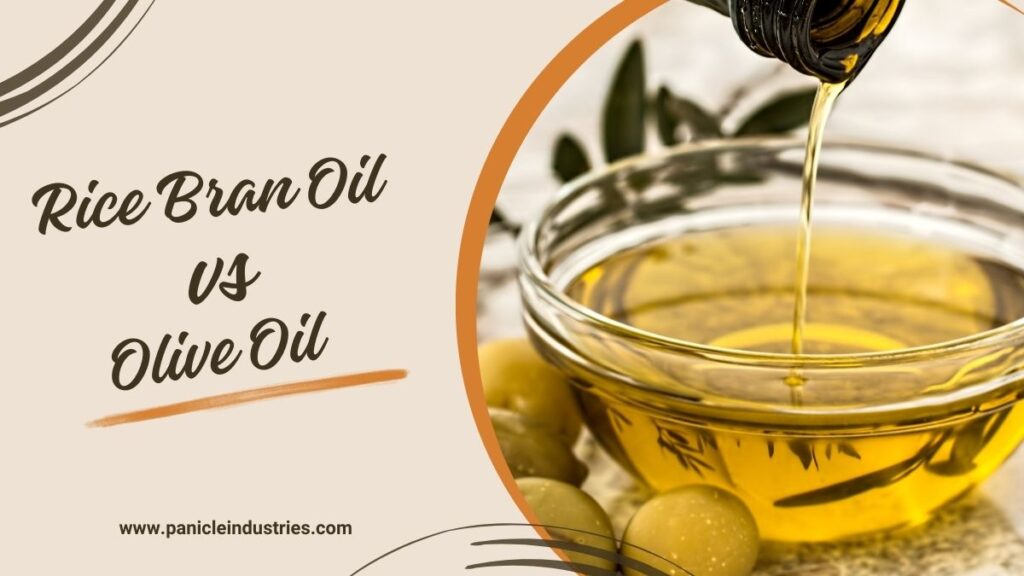When choosing a cooking oil, people often wonder which one is better – rice bran oil vs olive oil. Both oils are popular for their health benefits, and each has unique qualities that make them suitable for different types of cooking. Some people prefer rice bran oil for its high smoke point, while others go for olive oil because of its rich antioxidants. If you are confused about which oil to use in your kitchen, this blog will help you understand the differences and benefits of each.
Let’s take a closer look at rice bran oil vs olive oil to see which one suits your needs best.
What is Rice Bran Oil?
Rice bran oil is extracted from the outer layer of rice grains, known as bran. It is widely used in cooking due to its light texture, mild flavor, and high smoke point. This oil is rich in oryzanol, a powerful antioxidant that helps lower cholesterol and promotes heart health. It also contains a balanced mix of monounsaturated and polyunsaturated fats, making it a healthier choice for daily use. Due to its high stability at high temperatures, rice bran oil is ideal for frying, sautéing, and deep frying. Additionally, it is free from harmful trans fats and contains vitamin E, which supports skin and overall well-being.
What is Olive Oil?
Olive oil is extracted from olives, the fruit of the olive tree, and is widely used in Mediterranean cuisine. It is known for its rich monounsaturated fat content, particularly oleic acid, which supports heart health and reduces inflammation. Olive oil comes in different varieties, such as extra virgin, virgin, and refined, each differing in quality and flavor. Extra virgin olive oil is the least processed and contains high amounts of antioxidants like polyphenols, which protect the body from oxidative stress. It is best used for salad dressings, light sautéing, and drizzling over dishes rather than high-heat cooking.
Looking for the best edible oils for your kitchen? Check out our premium range of healthy oils here: edible oils and choose the perfect one for you!
Rice Bran Oil vs Olive Oil
1. Source and Extraction
Rice bran oil is extracted from the outer layer of rice grains, called bran. It is a byproduct of rice milling and is packed with nutrients. Olive oil, on the other hand, is obtained by pressing olives, a fruit that grows mainly in the Mediterranean region. The extraction process affects the nutritional value and purity of the oils.
2. Nutritional Content
Rice bran oil contains a balanced mix of monounsaturated, polyunsaturated, and saturated fats. It is also rich in oryzanol, which helps in lowering cholesterol. Olive oil is famous for its high monounsaturated fat content, particularly oleic acid, which supports heart health. Extra virgin olive oil contains powerful antioxidants like polyphenols, which reduce inflammation.
3. Heart Health Benefits
Both oils are good for heart health, but they work in slightly different ways. Rice bran oil helps reduce bad cholesterol (LDL) and increases good cholesterol (HDL). Olive oil has been proven to support heart function by preventing artery blockage and reducing blood pressure. If heart health is your priority, olive oil might have a slight edge due to its antioxidant properties.
4. Smoke Point and Cooking Uses
One major advantage of rice bran oil is its high smoke point of around 232°C (450°F). This makes it ideal for frying, deep frying, and high-heat cooking. Olive oil, especially extra virgin olive oil, has a lower smoke point of around 190°C (375°F), which makes it better for sautéing, salad dressings, and light cooking. If you often cook at high temperatures, rice bran oil may be the better choice.
5. Weight Management
If you are looking to maintain or lose weight, both oils can be beneficial. Rice bran oil boosts metabolism and helps the body burn calories efficiently. Olive oil, on the other hand, provides healthy fats that keep you full for longer, reducing cravings and preventing overeating.
6. Antioxidant and Anti-Inflammatory Properties
Olive oil is known for its rich antioxidants, particularly polyphenols and vitamin E, which help fight inflammation and protect cells from damage. Rice bran oil also contains antioxidants like oryzanol, but olive oil generally offers more anti-inflammatory benefits.
7. Digestive Health
Olive oil is known to support digestion and improve gut health. It helps in reducing acid reflux and aids in the smooth movement of food through the digestive system. Rice bran oil is also light on the stomach and easy to digest, but it does not offer the same gut benefits as olive oil.
8. Skin and Hair Benefits
Both oils have skincare and haircare benefits. Olive oil is often used for moisturizing skin and hair due to its rich vitamin E content. Rice bran oil is also good for the skin, helping in anti-aging and hydration. However, olive oil is more commonly used in beauty routines.
9. Cost and Availability
Rice bran oil is generally more affordable than olive oil, making it a budget-friendly option for daily cooking. Olive oil, especially extra virgin olive oil, is more expensive due to its complex extraction process and high nutritional value.
10. Final Verdict: Which One Should You Choose?
Choosing between rice bran oil vs olive oil depends on your cooking habits and health goals. If you prefer high-heat cooking like frying and deep frying, rice bran oil is a great option. If you want an oil rich in antioxidants and ideal for salads and light cooking, olive oil is the better choice.
Conclusion
Both rice bran oil and olive oil offer excellent health benefits. Rice bran oil vs olive oil is a common debate, but the choice depends on your needs. Rice bran oil is great for frying and has a high smoke point, while olive oil is rich in antioxidants and ideal for heart health. If possible, keep both oils in your kitchen and use them according to your cooking needs. A balanced diet with the right cooking oil can improve your overall health and well-being. Choose wisely and enjoy a healthy lifestyle!


